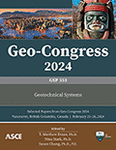Study on Hydraulic Conductivity of Cement-Treated Pavement Base Course Made of Recycled Plastic and Concrete Aggregates
Publication: Geo-Congress 2024
ABSTRACT
The primary objective of this study is to analyze the hydraulic characteristics of cement-treated pavement base course, which is fabricated of recycled plastics and recycled crushed concrete aggregates (RCCA). To fulfill this objective, representative cylindrical pavement base course samples, stabilized by certain dosages of cement, have been prepared incorporating both shredded plastics and recycled aggregates, and prepared samples were then subject to constant head permeability test following the standard of ASTM D2434. In this study, three different types of plastics, that is, polyethylene terephthalate (PET), high-density polyethylene (HDPE), polypropylene (PP), have been used in three varied proportions (0%, 3%, and 5%), and four different cement dosages (4%, 6%, 8%, and 10%) have been considered for stabilization purposes. This study comes to opine that percentage of both plastic and cement dosage in respective samples significantly influence hydraulic conductivity numbers of pavement base course. In short, this study did reveal that hydraulic conductivity values tend to lessen significantly with increasing cement dosage, and on the contrary, hydraulic conductivity numbers were observed to increase exponentially with the increase of plastic percentages.
Get full access to this article
View all available purchase options and get full access to this chapter.
REFERENCES
Bozyurt, O., Tinjum, J. M., Son, Y. H., Edil, T. B., and Benson, C. H. (2012). “Resilient Modulus of Recycled Asphalt Pavement and Recycled Concrete Aggregate.” Geo-Congress 2012, USA.
FHWA. (2011). “Reclaimed Asphalt Pavement in Asphalt Mixtures: State of the Practice. ”. FHWA, US Department of Transportation.
White, G. (2019). Evaluating Recycled Waste Plastic Modification and Extension of Bituminous Binder for Asphalt Eighteenth Annual International Conference on Pavement Engineering, Asphalt Technology and Infrastructure, Liverpool, UK.
White, G., and Reid, G. (2018). Recycled Waste Plastic for Extending and Modifying Asphalt Binders. 8th Symposium on Pavement Surface Characteristics: SURF 2018At: Brisbane, Queensland, Australia.
Hoyos, L. R., Puppala, A. J., and Ordonez, C. A. (2011). Characterization of cement fiber-treated reclaimed asphalt pavement aggregates: preliminary investigation. Journal of Materials in Civil Engineering, 23(7):977–989.
Huang, Y., Bird, R. N., and Heidrich, O. (2007). “A review of the use of recycled solid waste materials in asphalt pavements.” Resources, Conservation and Recycling Journal. Volume 52, Issue 1, November 2007, Pages 58–73.
Pasetto, M., and Baldo, N. (2012). “Experimental evaluation of high-performance base course and road base asphalt concrete with electric arc furnace steel slags.” Journal of hazardous materials 181 (1-3), 938–948.
Ordonez, C. A. (2007). Characterization of cemented and fiber-reinforced rap aggregate materials for base/sub-base applications. Journal of Materials in Civil Engineering.
Vasudevan, R., and Rajasekaran, S. (2006). “Study on the construction of flexible road using plastic coated aggregate”. Global Plastics Environmental Conference (GPEC), Atlanta, USA.
Rana, A. (2004). Evaluation of recycled material performance in highway applications and optimization of their use. PhD thesis, Texas Tech University.
Sanger, M., Natarajan, B. M., Wang, B., Edil, T., and Ginder-Vogel, M. (2020). “Recycled concrete aggregate in base course applications: Review of field and laboratory investigations of leachate pH”. Journal of Hazardous Materials, Volume 385.
Shopnil, M. S. R. (2022). Microplastic Risk Characterization of Plastic Road. PhD dissertation, The University of Texas at Arlington.
Snyder, M. B. (2016). Concrete Pavement Recycling and the Use of Recycled Concrete Aggregate in Concrete Paving Mixtures. CP Road MAP Brief March 2016. National Concrete Pavement Technology Center, Iowa State University, Ames, IA.
Sobhan, K., and Mashnad, M. (2003). Mechanical stabilization of cemented soil fly ash mixtures with recycled plastic strips. Journal of environmental engineering, 129(10):943–947.
Sojobi, A. O., Nwobodo, S. E., and Aladegboye, O. J. (2016). “Recycling of polyethylene terephthalate (PET) plastic bottle wastes in bituminous asphaltic concrete.” Cogent engineering 3(1): 1133480.
Texas, D. (2004). Standard specifications for construction and maintenance of highways, streets, and bridges. Austin, Tex.
Information & Authors
Information
Published In
History
Published online: Feb 22, 2024
ASCE Technical Topics:
Authors
Metrics & Citations
Metrics
Citations
Download citation
If you have the appropriate software installed, you can download article citation data to the citation manager of your choice. Simply select your manager software from the list below and click Download.
